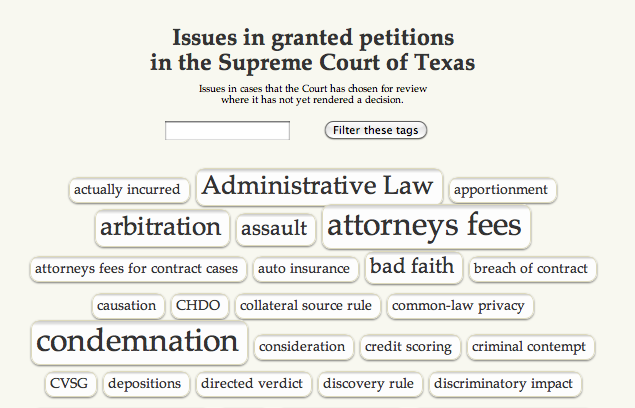I’ve been rolling out a steady stream of updates to the DocketDB site. I shared some of these at the recent Practicing Before the Supreme Court of Texas CLE. Since that time, I’ve added a new way to present the Court’s opinions.
Front-page search
The DocketDB home page now has a search box in the top right. Just start typing part of the name of a pending or recent case — and autocomplete will find the docket number for you.
It’s a small feature, but even I am finding it much easier to use DocketDB as the first stop in looking up a pending case. Once there, you can quickly find the slip opinions, the relevant court of appeals information, briefs from the case, or the most recent events.
Issues/Granted
A persistent question is how to track what issues are pending. This is a project that all court-watchers do in our own ways. But I realized that the DocketDB engine would be a good platform for a community effort.
If you go to http://docketdb.com/issues/granted, you’ll see the early results. This collects keyword tags about the pending cases in which the Court has granted review. (It’s focused on the granted petitions and those that have been submitted after oral argument.) Click on a tag, and you’ll be taken to a list of the relevant cases, with the usual links to news articles, briefs, and the most current status of the case.

My hesitation in rolling out this feature is that I don’t want to create a job for myself. (( Well, I didn’t want to create another job for myself. )) So, as I said at the Practicing Before the Supreme Court seminar, I’m approaching this “Issues/Granted” page as a community feature. I am happy to supply the platform and to keep the underlying data about each case fresh.
But the keywords require a human touch. Anyone registered with DocketDB can help tend this garden by adding relevant tags, and I hope you will participate. If enough of you pitch in just a little time, we all benefit. (( If you have questions about how this keyword system works, feel free to email me or give me a call. ))
To help everyone stay on the same page, there is now an autocomplete feature when you enter a tag — just start typing a new tag, and you’ll see what related keywords are already in the database.
An integrated version of the Court’s opinions
As you know, the Court publishes its opinions both as raw HTML files and as PDF slip opinions. In the past, I have linked to the HTML version on the Court’s website, which redirected your browser to that page.
Starting this week, DocketDB is now republishing these opinions. Here’s an example or two. And here’s why:
- Readability: The Court’s HTML version is generated by a word processor, and the result is text that wraps edge-to-edge on the screen. It’s often frustrating to read; I find myself re-sizing the browser window nearly every time. I opted to have a single-column of text that’s a more readable width.
-
Related opinions: My version collects all opinions from the same case along the sidebar — so you can quickly access a concurrence or dissent.
-
Faces: Everybody likes faces.
-
Warnings for withdrawn or at-risk opinions: My version gives you a warning if an opinion has been withdrawn (or rehearing has been granted). It gives you a gentler warning if a rehearing motion is still pending. These notices are kept up-to-date by the DocketDB database.
-
Link to the PDF: If you want to download the PDF version, there’s a direct link from the HTML page. You no longer have to backtrack to find it.
-
Quicker access to other DocketDB resources: You are now just a click away from links to related news stories, the underlying court of appeals information, or a list of the electronic briefs.
Those are the initial benefits. I’m also excited about the other, more advanced features that this should make possible. Your input is appreciated and, as always, you’ll be the first to know.


